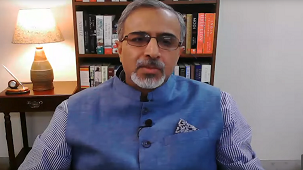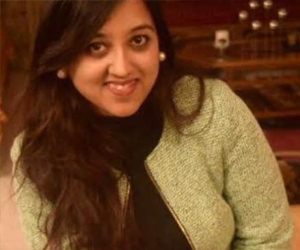On 14 March, 2022, the Vivekananda International Foundation (VIF) organised a Vimarsh on the “Russia-Ukraine Crisis”. The session encompassed a series of introductory remarks by Dr Arvind Gupta, Director VIF, and a talk on the stated theme by Ambassador D. Bala Venkatesh Varma (India’s former Ambassador to the Russian Federation) who focussed especially on the strategic trends and the impact of this ongoing crisis on the world in all the strategic dimensions.
Amb. Varma started the talk by stating that it is still very difficult to have clarity over an ongoing war. He appreciated the milestone achieved by the Government of India in evacuating all the Indians especially the Indian students stuck in this Global crossfire. He also highlighted the success of the Operation Ganga which was itself unique from other such evacuations from Yemen, Libya and Kuwait as it involved large number of students out of an active war zone. He attributed this to Indian influence with the Russia at highest level and the personal rapport between PM Modi and President Putin.
His introductory remarks covered the current happenings and how we reached at this point and then he went on to recount the strategic trends at global level and its impact on India. In this fortnight of operation, he described that Russians are fighting on four major fronts with different objectives. Though the official justification for the war is Demilitarisation and Denazification but the evidence on ground is different. The Eastern front which is the Donbas region (including Luhansk and Donetsk) contains the largest troop of Ukrainian forces which shows a high potential of frontal combat between the Russian and Ukrainian forces. In the South especially from Mykolaiv to Kharkiv, Russians have a specific military objective i.e. to step and stop the substantial NATO level military facility coming up in the Black Sea area (mainly Mariupol and Odessa). The third front where most of the international attention is focussed is the North. In this part the Russian invasion is through Belarusian border and has been a latter addition to the overall package. The last front is the Western front which has opened up recently and there is no physical occupation by the Ukrainian forces and therefore we see a flood of Western fighters. From the military perspective there are all four fronts but with unequal importance. Hence the progress is slow but objectives are not yet abandoned.
Amb. Varma also emphasised that the war is in Ukraine but it remains a global crisis. It has become a Russia versus the rest situation. He also highlighted that the war is being fought in four dimensions i.e. conventional, information domain, Cyber (not disruptive so far) and economic field (stunned the world with weaponisation of finance and Globalisation). There is an asymmetry in capabilities and vulnerabilities among different actors involved. The Brahmasastra of Sanctions was also interestingly used very early in order to destabilise the Russian political and economic system. Hence the potential for escalation of this conflict is very high. The political objectives are being defined in the absolutist term and this conflict has slowly become a crusade where the general public is being involved. Since a huge Western faction supports Ukraine, the key determining factor will be the military situation.
He also took a note of the fact that Russians and Ukrainians are close but distinct people. Though they come from same roots of Christianity and share a similar language and experience of being under Mongols and Czarist Empire yet the history took them separate ways with a common intention of territorial sovereignty and integrity. It has also been a divided country as Western Ukraine remained under European influence while eastern part under the Russian. The Ukrainian history has been influenced by Budapest Memorandum of 1994 driven by the Americans. Its interest in membership to NATO predates 2014 and goes back to 2002. It has always been an on/off issue and Russians are also aware that the final destination of NATO expansion was Ukraine. There has been upgradation of military capacity since 2014 with number of NATO exercises vis-a-vis Russia increasing to 150 times. Hence the Russian threat is real. The Minsk Agreement of 2014 has been termed as farce by the Russians as Ukrainian incentive to its commitment is decreasing under Western influence. Hence this fight has been fundamentally geopolitical in nature.
The ten strategic trends highlighted are that:
- It is a global conflict between Russia and the West.
- It is the first full-fledged Hybrid war of 21st century.
- It involves the whole societies therefore a crusade in its approach.
- Open, blatant and brutal weaponisation of network independence.
- Interdependence shows Russian vulnerability in the Globalised world.
- Demise in practical action on global commons and rule based international world.
- Inflation due to global disruption on supply chain of commodities.
- Agenda of Climate Change will undergo change.
- Unipolar Europe has arrived under the American leadership.
- Russian soft power and influence on Central Asian landmass may see a domino effect on the neighbouring countries.
Amb. Varma also briefly talked about role of China in this dynamic and believed that it has little to help Russian predicament on the Ukrainian ground though it can make thing difficult for Russia in terms of economic leverage. Yet its role is not very clear as of now.
His concluding remarks stresses on the fact that he fully supports the measures taken by India so far. This is not a fight we are related. This is a catastrophic failure, miscalculation and mismanagement of relations among big powers. Therefore India must not be asked to play a part for their policy failures. We do not believe in global ostracisation. India must also learn the critical things about weaponisation of a networked world and the new definition for the ideas of global commons and rule based order and a resilient supply chain. Therefore, a single geo-economic system has been punctured by geopolitics. We are a growing country with aspirations for ourselves and should have the freedom to do what is in our interest. Where the sanctions are not direct we should interpret the rules for our benefit and for this even the business community must be courageous to explore possibility of harnessing commercial interests along with strengthening the idea of Make in India.
Dr Gupta then took over and shared his concluding remarks. After having thanked the speaker for his informative and insightful talk, he opened the floor for further discussion.









Post new comment